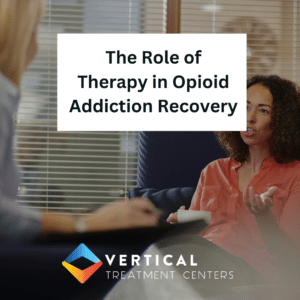
The Role of Therapy in Opioid Addiction Recovery
Opioid addiction recovery is a complex journey that requires a comprehensive approach to achieve long-term success. While medication-assisted treatment (MAT) plays a critical role in managing withdrawal symptoms and cravings, therapy is equally important in addressing the underlying issues that contribute to addiction. In this blog post, we will explore the various forms of therapy and their vital role in supporting individuals on their path to opioid addiction recovery.
Individual Therapy: Unveiling the Psychological Factors
Opioid addiction often stems from underlying psychological factors such as trauma, depression, anxiety, or other mental health conditions. Individual therapy provides a safe space for individuals to delve into these factors, process their emotions, and gain a deeper understanding of their addiction. Through evidence-based therapies like Cognitive Behavioral Therapy (CBT) and Dialectical Behavior Therapy (DBT), therapists help individuals identify triggers, develop coping strategies, and foster resilience to prevent relapse.
Group Therapy: Building Support Systems
Addiction can be an isolating experience, making it difficult for individuals to envision a life without opioids. Group therapy offers a supportive environment where individuals can connect with others going through similar struggles. It provides a platform for sharing experiences, offering and receiving empathy, and providing peer support. Group therapy not only reduces feelings of isolation but also fosters a sense of belonging and accountability within the recovery community.
Family Therapy: Restoring Relationships
The impact of opioid addiction is not limited to the individual suffering from addiction; it affects the entire family unit. Family therapy aims to heal and rebuild relationships that may have been strained or broken due to addiction. It helps family members understand addiction as a disease, improve communication, set healthy boundaries, and develop strategies to support their loved one’s recovery. By involving the family in the therapy process, individuals in recovery have a stronger support system, increasing the chances of successful, long-term recovery.
Behavioral Therapy: Rewiring Patterns and Habits
Opioid addiction often leads to destructive behaviors and patterns that need to be addressed and replaced with healthy alternatives. Behavioral therapies like contingency management and motivational interviewing help individuals identify negative patterns and develop new, positive behaviors. These therapies offer practical tools and techniques to manage triggers and temptations, promoting healthy habits and reducing the risk of relapse.
Conclusion
Therapy is an essential component of opioid addiction recovery, complementing medication-assisted treatment to address the psychological and emotional aspects of addiction. Individual therapy helps individuals uncover and address underlying issues, while group therapy provides a supportive environment for connecting with peers. Family therapy rebuilds relationships and strengthens support systems, and behavioral therapy helps individuals develop healthy habits and coping strategies. By integrating therapy into opioid addiction treatment, individuals are better equipped to overcome addiction, maintain sobriety, and lead fulfilling lives.